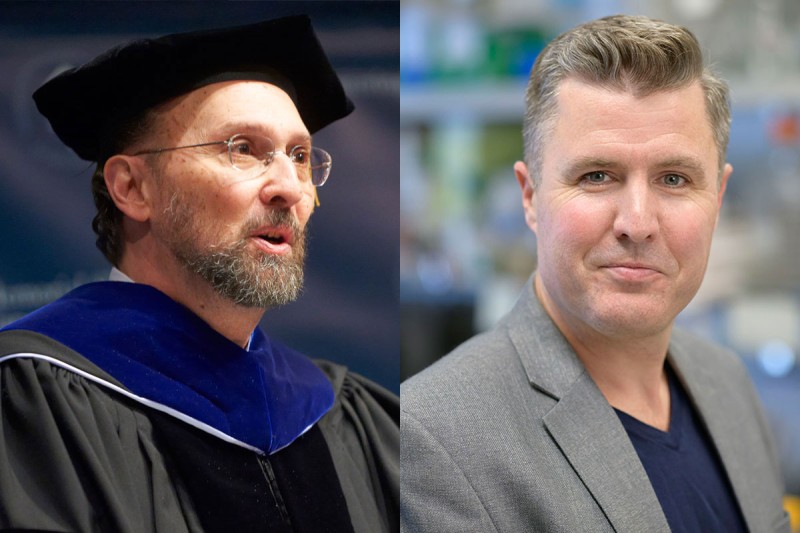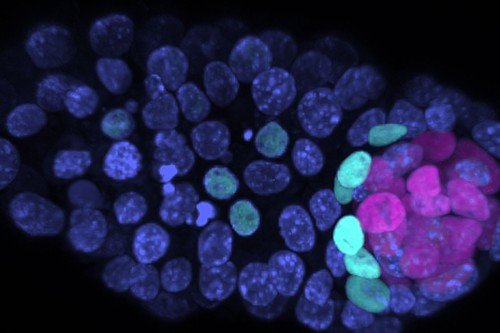
Cell biologist Michael Overholtzer (right) will succeed DNA replication expert Ken Marians as Dean of GSK.
Call it a changing of the guard. Come January 1, 2019, the Gerstner Sloan Kettering Graduate School of Biomedical Sciences (GSK) — MSK’s PhD-granting institution — will have a new dean. GSK’s Board of Trustees voted yesterday to appoint cell biologist Michael Overholtzer to this important role. Dr. Overholtzer will succeed molecular biologist Ken Marians, GSK’s founding Dean, who has served in that position for more than a decade.
GSK Provost and Sloan Kettering Institute Director Joan Massagué announced the decision to the faculty and students last night.
“Across SKI, Mike Overholtzer is by far one of our most active, visionary, and committed faculty members when it comes to guiding graduate education,” Dr. Massagué says. “He is an ideal candidate to take over as the next dean of GSK.”
Innovative Researcher, Valued Institutional Citizen
A member of the SKI Cell Biology Program since 2008, Dr. Overholtzer is an internationally recognized cell biologist who has made major contributions to scientists’ understanding of cell death. He was the first to describe entosis, a form of cell death that involves “winner” cells eating “loser” cells.

He furthered showed that entosis provides a selective growth advantage for tumor cells, by permitting them to gain chromosomes and scavenge nutrients. More recently, he provided the first evidence that entosis occurs during normal development too.
Dr. Overholtzer has also made important discoveries related to another form of cell death called ferroptosis — literally death by iron. He found that nanoparticles can induce this form of cell death, which kills by causing reactive oxygen species to build up and overwhelm the cell. Together with colleagues at MSK and Weill Cornell, Dr. Overholtzer is exploring ways to harness this type of cell death as a form of cancer therapy.
In addition to his scientific credentials, Dr. Overholtzer brings a wealth of teaching and administrative experience to his new role. He has been Co-Director of the Biochemistry, Structural Biology, Cell Biology, Developmental Biology, and Molecular Biology Program at the shared graduate school between Weill Cornell Medicine and SKI, and he has chaired the program’s admission committee. He has also taught numerous courses for both GSK and Weill Cornell and served as Director of GSK’s Summer Undergraduate Research Program (SURP).
Colleagues call him an extraordinary institutional citizen.
A Strong Foundation
Dr. Overholtzer will succeed Kenneth Marians, who — along with former MSK President Harold Varmus and former SKI Director Tom Kelly — helped conceive of the school and bring it into existence.
Dr. Marians oversaw the application processes for GSK’s charter, granted by the New York State Board of Education in 2004, as well as its accreditation, approved by the New York State Board of Regents in 2008.
He has served as Dean for 13 classes of students, advising close to 60 of GSK’s first graduates.
“GSK is the shining jewel in the MSK educational crown, and its success can be largely attributed to the wisdom and hard work of Dr. Marians,” Dr. Massagué says.
Dr. Marians is a devoted teacher and mentor. As Dean, he has made it a point to attend weekly graduate student seminars to keep track of the year-to-year progress of every student.
“Ken would take notes on each student’s oral presentation and was always able to cite the research progress of any student in the program,” GSK Associate Dean Linda Burnley recalls. “He similarly would attend all poster sessions for both PhD and SURP students, probing them and giving feedback.”
Together with two faculty members, Dr. Marians regularly taught the GSK course Logical and Critical Analysis, which is held once per week for five weeks every August. It is in this course, he says, that students learn — or rather unlearn — how to read a scientific paper critically.
“We try to convince students that if they really want to make it in this business, they’ve got to learn to read critically,” Dr. Marians says. “That means not just reading the abstract and the conclusion but really analyzing the methods and asking whether the data support the conclusions.
“I think if you ask students, a lot of them will tell you that this course is one of the best parts of the curriculum,” he adds.
Though he will miss interacting with students, Dr. Marians is looking forward to starting up some new projects in his lab. And he has confidence that Dr. Overholtzer will capably steer GSK into its next phase.
“I think Mike will do a great job,” he says. “He’s already held important leadership roles here and at Weill Cornell. He’s very interactive and collaborative. I think he’ll be terrific.”
For his part, Dr. Overholzter is proud to have been entrusted with this important role. “Under Dr. Marians’s leadership, GSK has become a top graduate school in the biomedical sciences that attracts outstanding students,” he says. “I am particularly honored to follow in his footsteps and excited for the future of GSK.”
Next week we’ll have an interview with Dr. Marians as he reflects on his legacy as Dean.




